Factors, Development, and Differences in Leadership Report
VerifiedAdded on 2020/07/22
|12
|3942
|38
Report
AI Summary
This report delves into the critical roles of leadership and management within organizations, emphasizing their importance in motivating and supporting employees to enhance performance. It examines the factors contributing to successful leadership, including self-management, strategic thinking, effective communication, accountability, and a clear vision for the future. The report also explores how leadership skills can be developed through discipline, self-awareness, learning from failures, taking on more responsibility, and continuous learning. Furthermore, it differentiates between leadership and management, highlighting their distinct functions and responsibilities within an organization, such as planning, organizing, and influencing. The report concludes with a self-reflection on the student's understanding of leadership.
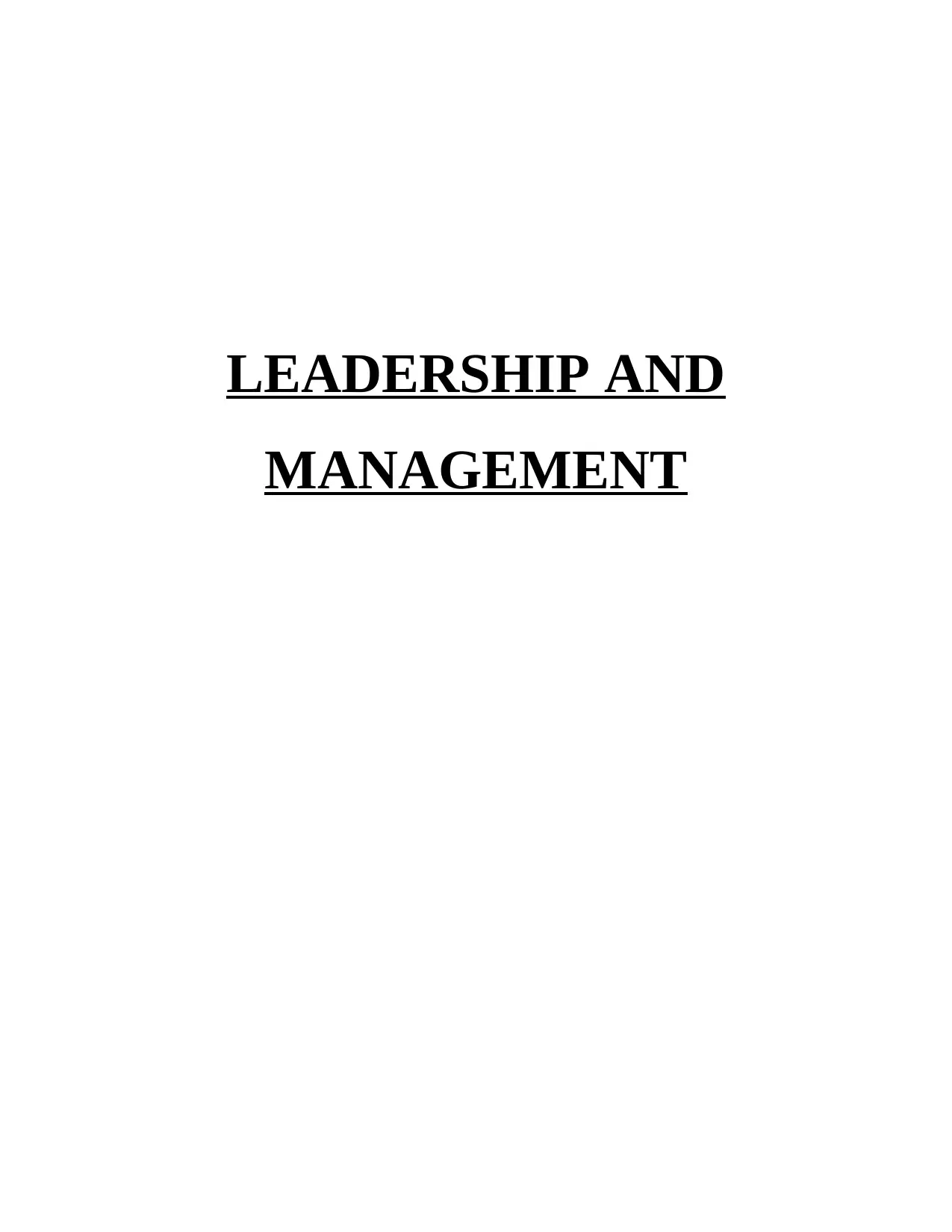
LEADERSHIP AND
MANAGEMENT
MANAGEMENT
Paraphrase This Document
Need a fresh take? Get an instant paraphrase of this document with our AI Paraphraser
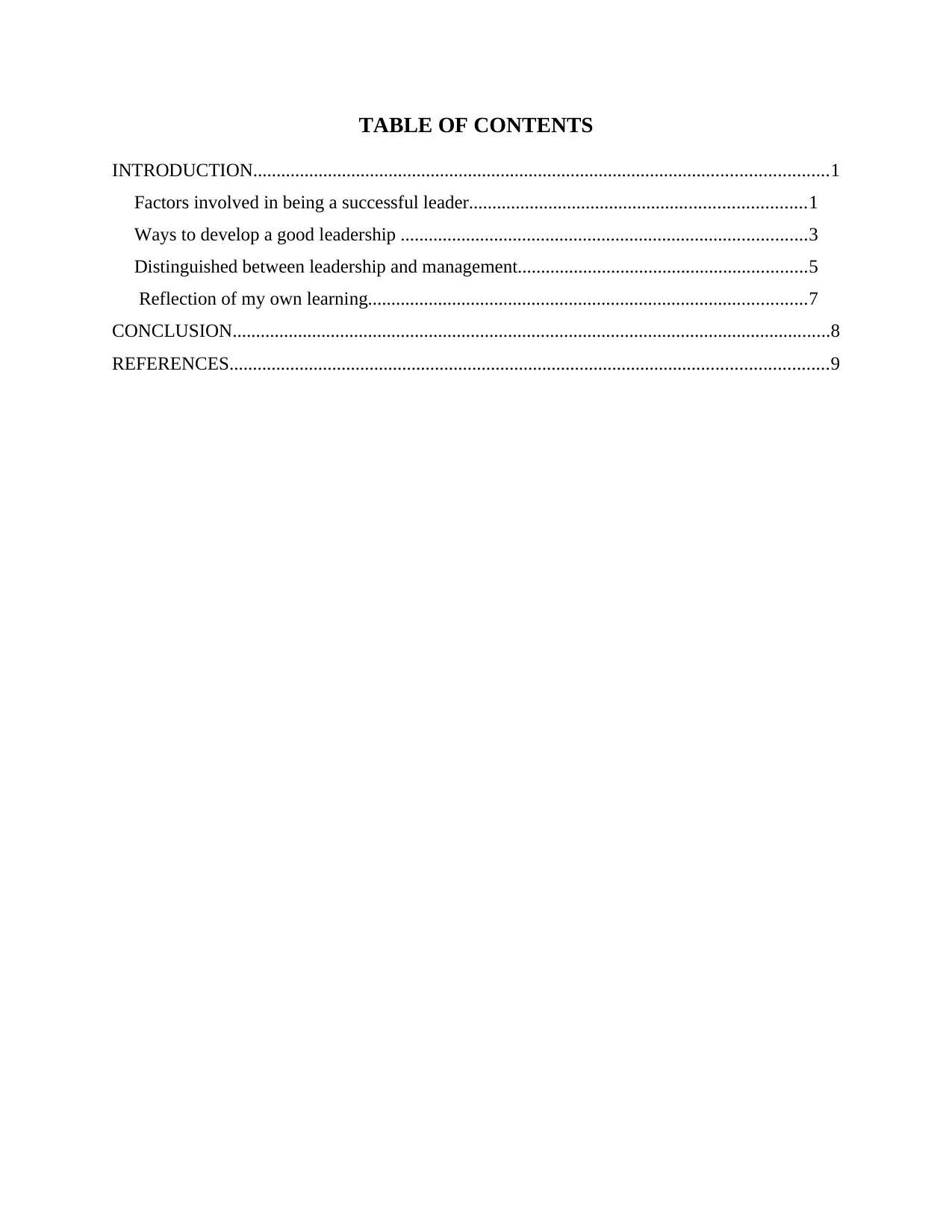
TABLE OF CONTENTS
INTRODUCTION...........................................................................................................................1
Factors involved in being a successful leader........................................................................1
Ways to develop a good leadership .......................................................................................3
Distinguished between leadership and management..............................................................5
Reflection of my own learning..............................................................................................7
CONCLUSION................................................................................................................................8
REFERENCES................................................................................................................................9
INTRODUCTION...........................................................................................................................1
Factors involved in being a successful leader........................................................................1
Ways to develop a good leadership .......................................................................................3
Distinguished between leadership and management..............................................................5
Reflection of my own learning..............................................................................................7
CONCLUSION................................................................................................................................8
REFERENCES................................................................................................................................9
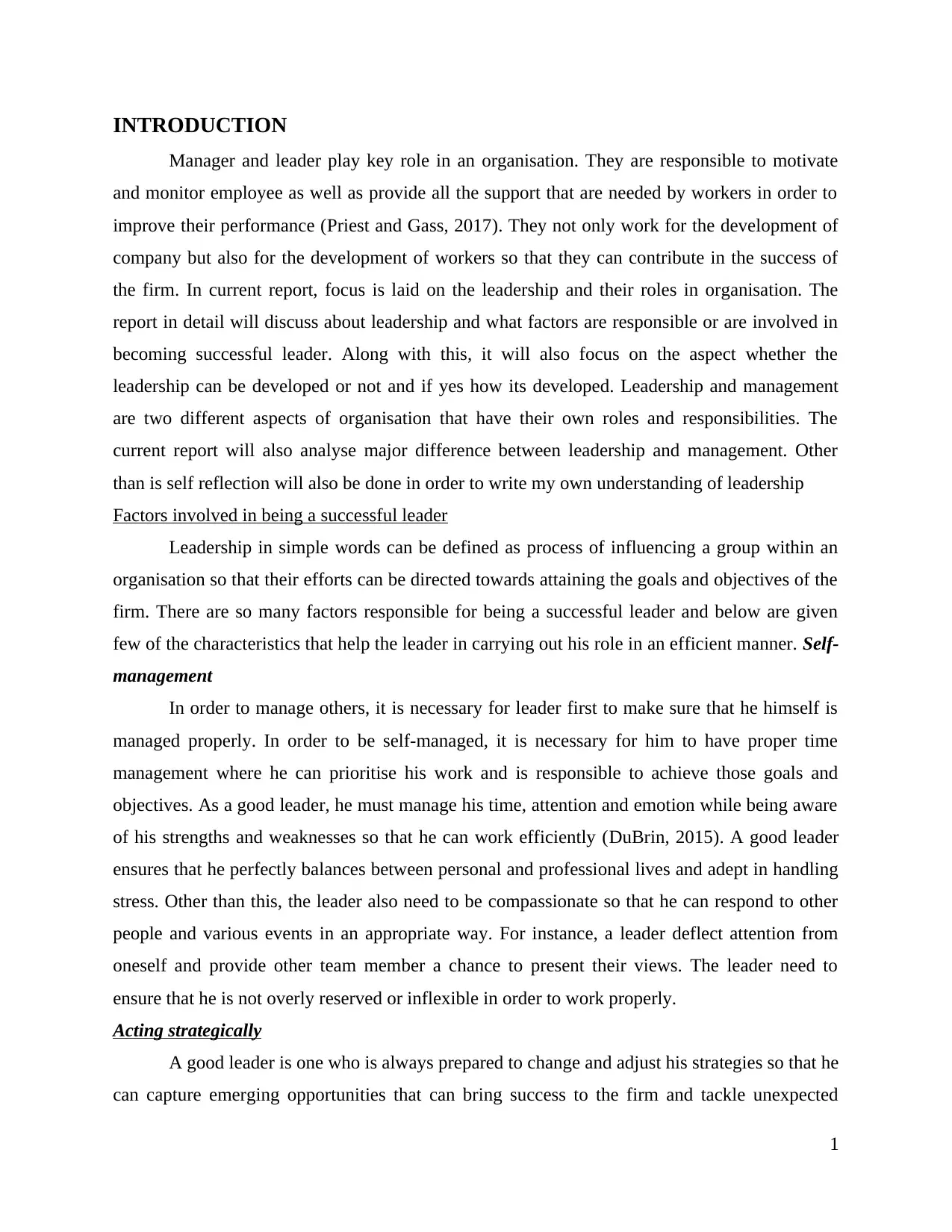
INTRODUCTION
Manager and leader play key role in an organisation. They are responsible to motivate
and monitor employee as well as provide all the support that are needed by workers in order to
improve their performance (Priest and Gass, 2017). They not only work for the development of
company but also for the development of workers so that they can contribute in the success of
the firm. In current report, focus is laid on the leadership and their roles in organisation. The
report in detail will discuss about leadership and what factors are responsible or are involved in
becoming successful leader. Along with this, it will also focus on the aspect whether the
leadership can be developed or not and if yes how its developed. Leadership and management
are two different aspects of organisation that have their own roles and responsibilities. The
current report will also analyse major difference between leadership and management. Other
than is self reflection will also be done in order to write my own understanding of leadership
Factors involved in being a successful leader
Leadership in simple words can be defined as process of influencing a group within an
organisation so that their efforts can be directed towards attaining the goals and objectives of the
firm. There are so many factors responsible for being a successful leader and below are given
few of the characteristics that help the leader in carrying out his role in an efficient manner. Self-
management
In order to manage others, it is necessary for leader first to make sure that he himself is
managed properly. In order to be self-managed, it is necessary for him to have proper time
management where he can prioritise his work and is responsible to achieve those goals and
objectives. As a good leader, he must manage his time, attention and emotion while being aware
of his strengths and weaknesses so that he can work efficiently (DuBrin, 2015). A good leader
ensures that he perfectly balances between personal and professional lives and adept in handling
stress. Other than this, the leader also need to be compassionate so that he can respond to other
people and various events in an appropriate way. For instance, a leader deflect attention from
oneself and provide other team member a chance to present their views. The leader need to
ensure that he is not overly reserved or inflexible in order to work properly.
Acting strategically
A good leader is one who is always prepared to change and adjust his strategies so that he
can capture emerging opportunities that can bring success to the firm and tackle unexpected
1
Manager and leader play key role in an organisation. They are responsible to motivate
and monitor employee as well as provide all the support that are needed by workers in order to
improve their performance (Priest and Gass, 2017). They not only work for the development of
company but also for the development of workers so that they can contribute in the success of
the firm. In current report, focus is laid on the leadership and their roles in organisation. The
report in detail will discuss about leadership and what factors are responsible or are involved in
becoming successful leader. Along with this, it will also focus on the aspect whether the
leadership can be developed or not and if yes how its developed. Leadership and management
are two different aspects of organisation that have their own roles and responsibilities. The
current report will also analyse major difference between leadership and management. Other
than is self reflection will also be done in order to write my own understanding of leadership
Factors involved in being a successful leader
Leadership in simple words can be defined as process of influencing a group within an
organisation so that their efforts can be directed towards attaining the goals and objectives of the
firm. There are so many factors responsible for being a successful leader and below are given
few of the characteristics that help the leader in carrying out his role in an efficient manner. Self-
management
In order to manage others, it is necessary for leader first to make sure that he himself is
managed properly. In order to be self-managed, it is necessary for him to have proper time
management where he can prioritise his work and is responsible to achieve those goals and
objectives. As a good leader, he must manage his time, attention and emotion while being aware
of his strengths and weaknesses so that he can work efficiently (DuBrin, 2015). A good leader
ensures that he perfectly balances between personal and professional lives and adept in handling
stress. Other than this, the leader also need to be compassionate so that he can respond to other
people and various events in an appropriate way. For instance, a leader deflect attention from
oneself and provide other team member a chance to present their views. The leader need to
ensure that he is not overly reserved or inflexible in order to work properly.
Acting strategically
A good leader is one who is always prepared to change and adjust his strategies so that he
can capture emerging opportunities that can bring success to the firm and tackle unexpected
1
⊘ This is a preview!⊘
Do you want full access?
Subscribe today to unlock all pages.

Trusted by 1+ million students worldwide
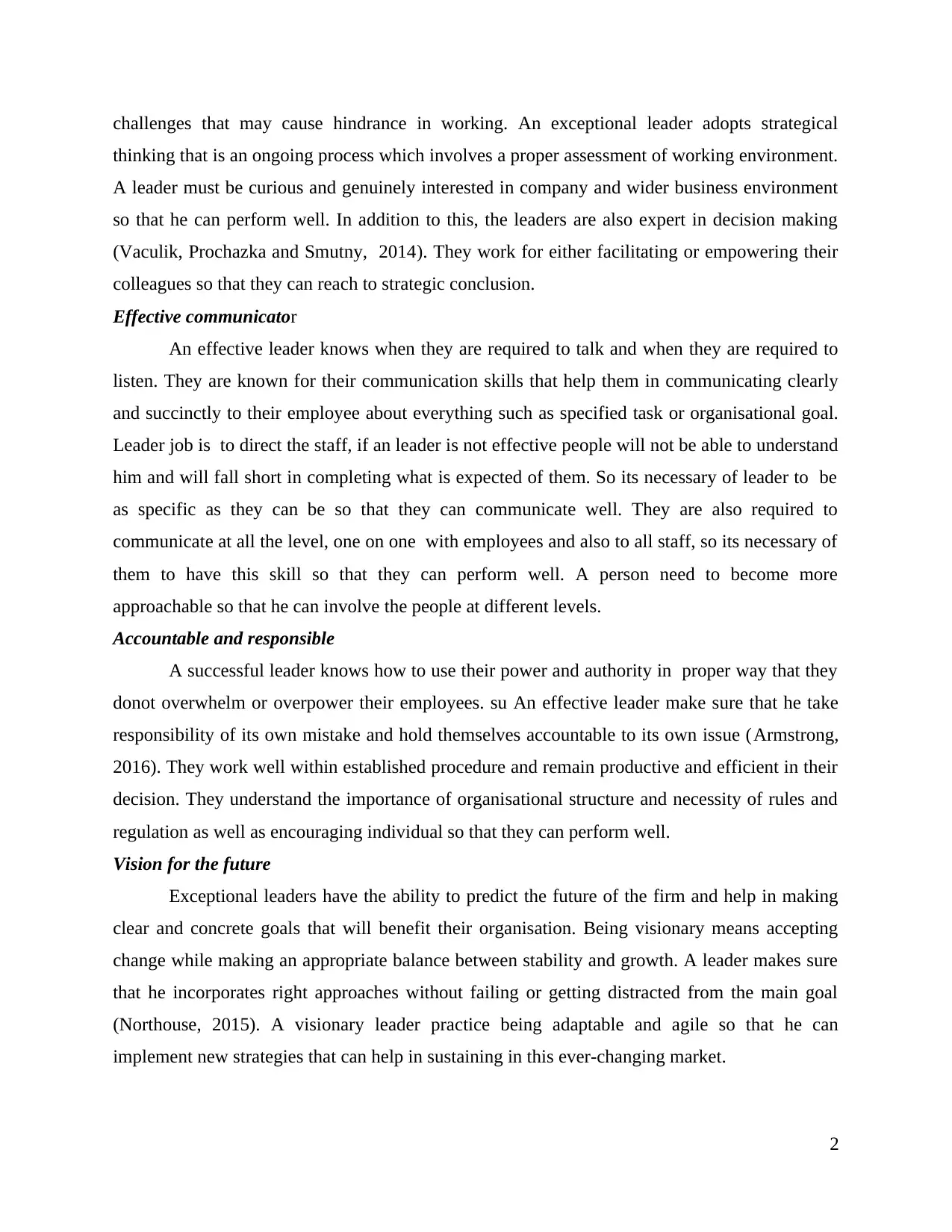
challenges that may cause hindrance in working. An exceptional leader adopts strategical
thinking that is an ongoing process which involves a proper assessment of working environment.
A leader must be curious and genuinely interested in company and wider business environment
so that he can perform well. In addition to this, the leaders are also expert in decision making
(Vaculik, Prochazka and Smutny, 2014). They work for either facilitating or empowering their
colleagues so that they can reach to strategic conclusion.
Effective communicator
An effective leader knows when they are required to talk and when they are required to
listen. They are known for their communication skills that help them in communicating clearly
and succinctly to their employee about everything such as specified task or organisational goal.
Leader job is to direct the staff, if an leader is not effective people will not be able to understand
him and will fall short in completing what is expected of them. So its necessary of leader to be
as specific as they can be so that they can communicate well. They are also required to
communicate at all the level, one on one with employees and also to all staff, so its necessary of
them to have this skill so that they can perform well. A person need to become more
approachable so that he can involve the people at different levels.
Accountable and responsible
A successful leader knows how to use their power and authority in proper way that they
donot overwhelm or overpower their employees. su An effective leader make sure that he take
responsibility of its own mistake and hold themselves accountable to its own issue (Armstrong,
2016). They work well within established procedure and remain productive and efficient in their
decision. They understand the importance of organisational structure and necessity of rules and
regulation as well as encouraging individual so that they can perform well.
Vision for the future
Exceptional leaders have the ability to predict the future of the firm and help in making
clear and concrete goals that will benefit their organisation. Being visionary means accepting
change while making an appropriate balance between stability and growth. A leader makes sure
that he incorporates right approaches without failing or getting distracted from the main goal
(Northouse, 2015). A visionary leader practice being adaptable and agile so that he can
implement new strategies that can help in sustaining in this ever-changing market.
2
thinking that is an ongoing process which involves a proper assessment of working environment.
A leader must be curious and genuinely interested in company and wider business environment
so that he can perform well. In addition to this, the leaders are also expert in decision making
(Vaculik, Prochazka and Smutny, 2014). They work for either facilitating or empowering their
colleagues so that they can reach to strategic conclusion.
Effective communicator
An effective leader knows when they are required to talk and when they are required to
listen. They are known for their communication skills that help them in communicating clearly
and succinctly to their employee about everything such as specified task or organisational goal.
Leader job is to direct the staff, if an leader is not effective people will not be able to understand
him and will fall short in completing what is expected of them. So its necessary of leader to be
as specific as they can be so that they can communicate well. They are also required to
communicate at all the level, one on one with employees and also to all staff, so its necessary of
them to have this skill so that they can perform well. A person need to become more
approachable so that he can involve the people at different levels.
Accountable and responsible
A successful leader knows how to use their power and authority in proper way that they
donot overwhelm or overpower their employees. su An effective leader make sure that he take
responsibility of its own mistake and hold themselves accountable to its own issue (Armstrong,
2016). They work well within established procedure and remain productive and efficient in their
decision. They understand the importance of organisational structure and necessity of rules and
regulation as well as encouraging individual so that they can perform well.
Vision for the future
Exceptional leaders have the ability to predict the future of the firm and help in making
clear and concrete goals that will benefit their organisation. Being visionary means accepting
change while making an appropriate balance between stability and growth. A leader makes sure
that he incorporates right approaches without failing or getting distracted from the main goal
(Northouse, 2015). A visionary leader practice being adaptable and agile so that he can
implement new strategies that can help in sustaining in this ever-changing market.
2
Paraphrase This Document
Need a fresh take? Get an instant paraphrase of this document with our AI Paraphraser
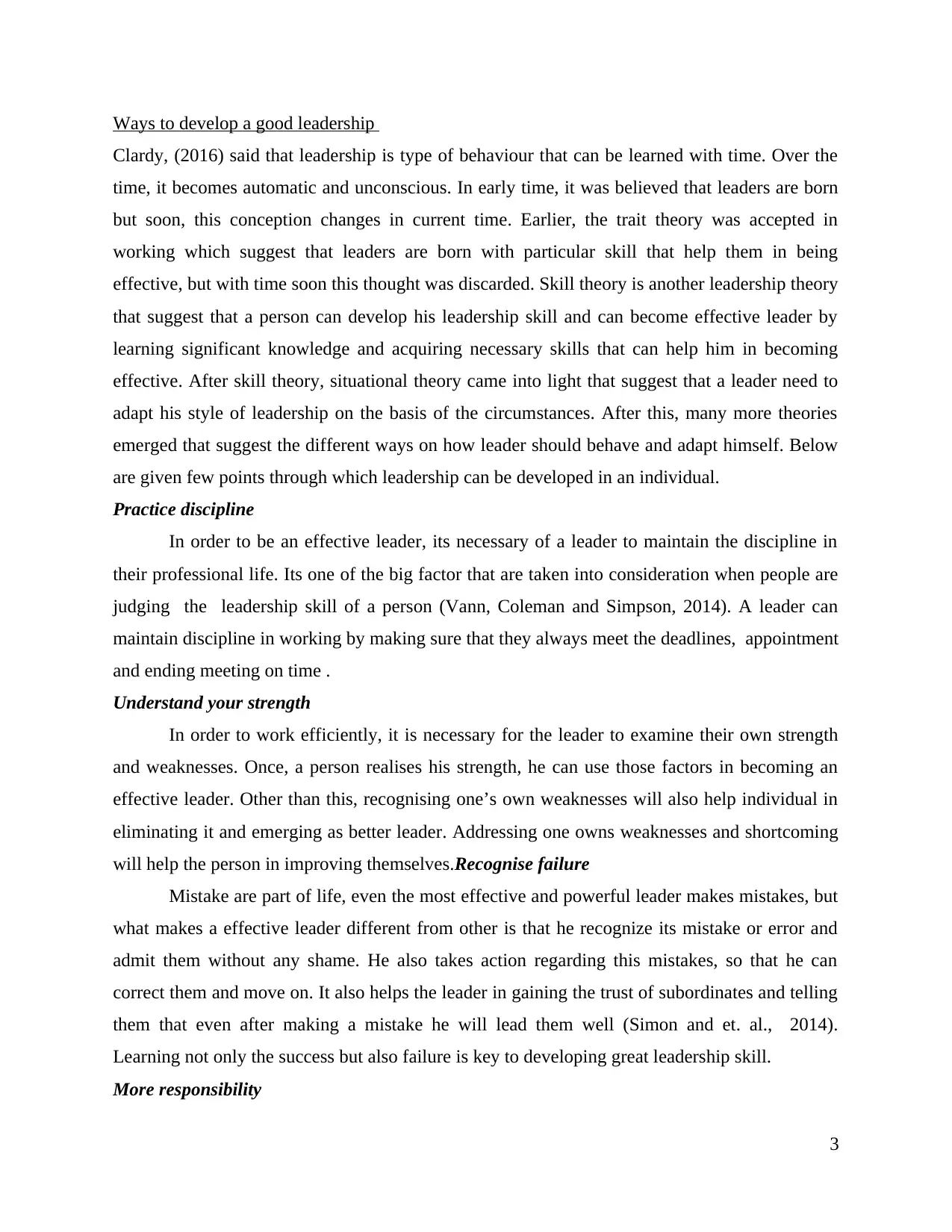
Ways to develop a good leadership
Clardy, (2016) said that leadership is type of behaviour that can be learned with time. Over the
time, it becomes automatic and unconscious. In early time, it was believed that leaders are born
but soon, this conception changes in current time. Earlier, the trait theory was accepted in
working which suggest that leaders are born with particular skill that help them in being
effective, but with time soon this thought was discarded. Skill theory is another leadership theory
that suggest that a person can develop his leadership skill and can become effective leader by
learning significant knowledge and acquiring necessary skills that can help him in becoming
effective. After skill theory, situational theory came into light that suggest that a leader need to
adapt his style of leadership on the basis of the circumstances. After this, many more theories
emerged that suggest the different ways on how leader should behave and adapt himself. Below
are given few points through which leadership can be developed in an individual.
Practice discipline
In order to be an effective leader, its necessary of a leader to maintain the discipline in
their professional life. Its one of the big factor that are taken into consideration when people are
judging the leadership skill of a person (Vann, Coleman and Simpson, 2014). A leader can
maintain discipline in working by making sure that they always meet the deadlines, appointment
and ending meeting on time .
Understand your strength
In order to work efficiently, it is necessary for the leader to examine their own strength
and weaknesses. Once, a person realises his strength, he can use those factors in becoming an
effective leader. Other than this, recognising one’s own weaknesses will also help individual in
eliminating it and emerging as better leader. Addressing one owns weaknesses and shortcoming
will help the person in improving themselves.Recognise failure
Mistake are part of life, even the most effective and powerful leader makes mistakes, but
what makes a effective leader different from other is that he recognize its mistake or error and
admit them without any shame. He also takes action regarding this mistakes, so that he can
correct them and move on. It also helps the leader in gaining the trust of subordinates and telling
them that even after making a mistake he will lead them well (Simon and et. al., 2014).
Learning not only the success but also failure is key to developing great leadership skill.
More responsibility
3
Clardy, (2016) said that leadership is type of behaviour that can be learned with time. Over the
time, it becomes automatic and unconscious. In early time, it was believed that leaders are born
but soon, this conception changes in current time. Earlier, the trait theory was accepted in
working which suggest that leaders are born with particular skill that help them in being
effective, but with time soon this thought was discarded. Skill theory is another leadership theory
that suggest that a person can develop his leadership skill and can become effective leader by
learning significant knowledge and acquiring necessary skills that can help him in becoming
effective. After skill theory, situational theory came into light that suggest that a leader need to
adapt his style of leadership on the basis of the circumstances. After this, many more theories
emerged that suggest the different ways on how leader should behave and adapt himself. Below
are given few points through which leadership can be developed in an individual.
Practice discipline
In order to be an effective leader, its necessary of a leader to maintain the discipline in
their professional life. Its one of the big factor that are taken into consideration when people are
judging the leadership skill of a person (Vann, Coleman and Simpson, 2014). A leader can
maintain discipline in working by making sure that they always meet the deadlines, appointment
and ending meeting on time .
Understand your strength
In order to work efficiently, it is necessary for the leader to examine their own strength
and weaknesses. Once, a person realises his strength, he can use those factors in becoming an
effective leader. Other than this, recognising one’s own weaknesses will also help individual in
eliminating it and emerging as better leader. Addressing one owns weaknesses and shortcoming
will help the person in improving themselves.Recognise failure
Mistake are part of life, even the most effective and powerful leader makes mistakes, but
what makes a effective leader different from other is that he recognize its mistake or error and
admit them without any shame. He also takes action regarding this mistakes, so that he can
correct them and move on. It also helps the leader in gaining the trust of subordinates and telling
them that even after making a mistake he will lead them well (Simon and et. al., 2014).
Learning not only the success but also failure is key to developing great leadership skill.
More responsibility
3
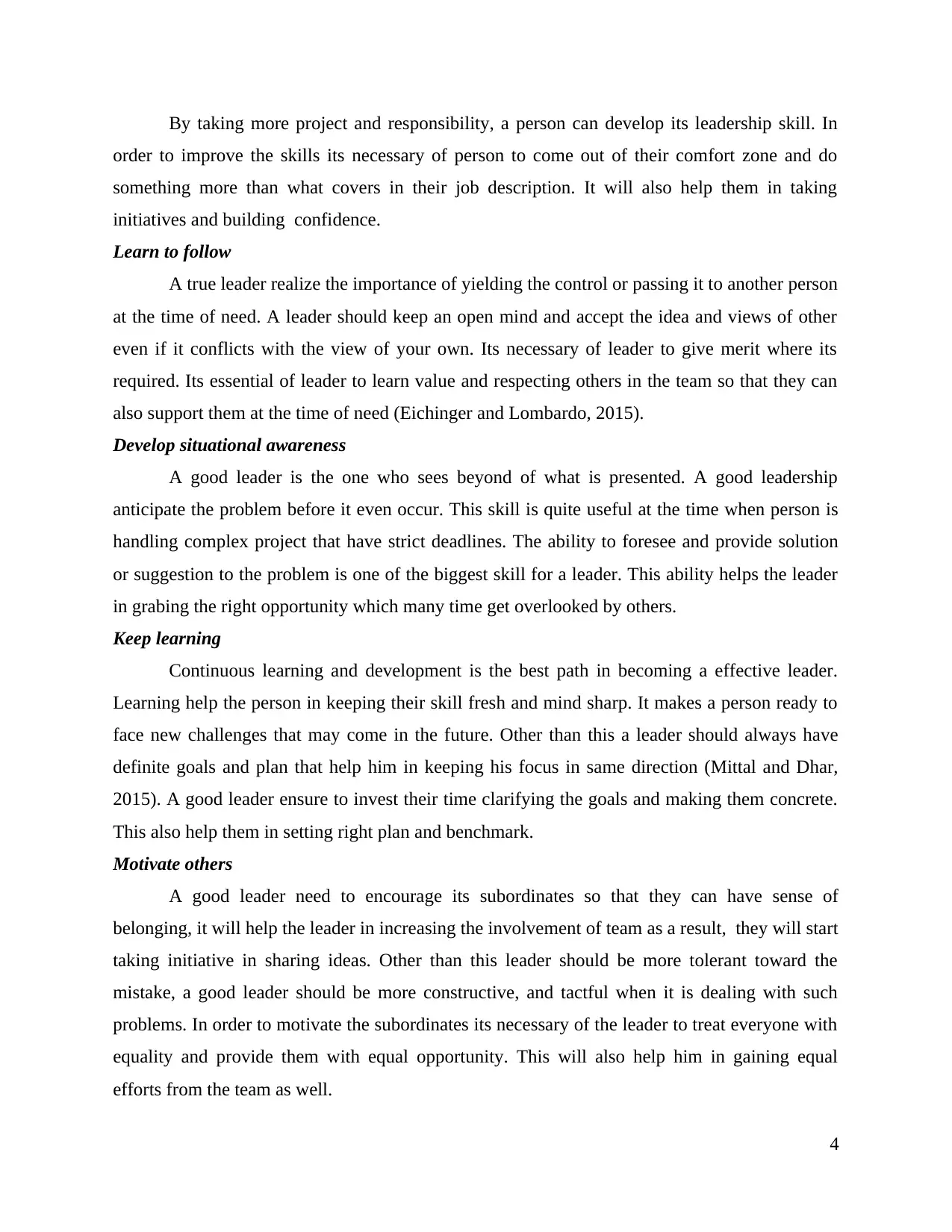
By taking more project and responsibility, a person can develop its leadership skill. In
order to improve the skills its necessary of person to come out of their comfort zone and do
something more than what covers in their job description. It will also help them in taking
initiatives and building confidence.
Learn to follow
A true leader realize the importance of yielding the control or passing it to another person
at the time of need. A leader should keep an open mind and accept the idea and views of other
even if it conflicts with the view of your own. Its necessary of leader to give merit where its
required. Its essential of leader to learn value and respecting others in the team so that they can
also support them at the time of need (Eichinger and Lombardo, 2015).
Develop situational awareness
A good leader is the one who sees beyond of what is presented. A good leadership
anticipate the problem before it even occur. This skill is quite useful at the time when person is
handling complex project that have strict deadlines. The ability to foresee and provide solution
or suggestion to the problem is one of the biggest skill for a leader. This ability helps the leader
in grabing the right opportunity which many time get overlooked by others.
Keep learning
Continuous learning and development is the best path in becoming a effective leader.
Learning help the person in keeping their skill fresh and mind sharp. It makes a person ready to
face new challenges that may come in the future. Other than this a leader should always have
definite goals and plan that help him in keeping his focus in same direction (Mittal and Dhar,
2015). A good leader ensure to invest their time clarifying the goals and making them concrete.
This also help them in setting right plan and benchmark.
Motivate others
A good leader need to encourage its subordinates so that they can have sense of
belonging, it will help the leader in increasing the involvement of team as a result, they will start
taking initiative in sharing ideas. Other than this leader should be more tolerant toward the
mistake, a good leader should be more constructive, and tactful when it is dealing with such
problems. In order to motivate the subordinates its necessary of the leader to treat everyone with
equality and provide them with equal opportunity. This will also help him in gaining equal
efforts from the team as well.
4
order to improve the skills its necessary of person to come out of their comfort zone and do
something more than what covers in their job description. It will also help them in taking
initiatives and building confidence.
Learn to follow
A true leader realize the importance of yielding the control or passing it to another person
at the time of need. A leader should keep an open mind and accept the idea and views of other
even if it conflicts with the view of your own. Its necessary of leader to give merit where its
required. Its essential of leader to learn value and respecting others in the team so that they can
also support them at the time of need (Eichinger and Lombardo, 2015).
Develop situational awareness
A good leader is the one who sees beyond of what is presented. A good leadership
anticipate the problem before it even occur. This skill is quite useful at the time when person is
handling complex project that have strict deadlines. The ability to foresee and provide solution
or suggestion to the problem is one of the biggest skill for a leader. This ability helps the leader
in grabing the right opportunity which many time get overlooked by others.
Keep learning
Continuous learning and development is the best path in becoming a effective leader.
Learning help the person in keeping their skill fresh and mind sharp. It makes a person ready to
face new challenges that may come in the future. Other than this a leader should always have
definite goals and plan that help him in keeping his focus in same direction (Mittal and Dhar,
2015). A good leader ensure to invest their time clarifying the goals and making them concrete.
This also help them in setting right plan and benchmark.
Motivate others
A good leader need to encourage its subordinates so that they can have sense of
belonging, it will help the leader in increasing the involvement of team as a result, they will start
taking initiative in sharing ideas. Other than this leader should be more tolerant toward the
mistake, a good leader should be more constructive, and tactful when it is dealing with such
problems. In order to motivate the subordinates its necessary of the leader to treat everyone with
equality and provide them with equal opportunity. This will also help him in gaining equal
efforts from the team as well.
4
⊘ This is a preview!⊘
Do you want full access?
Subscribe today to unlock all pages.

Trusted by 1+ million students worldwide
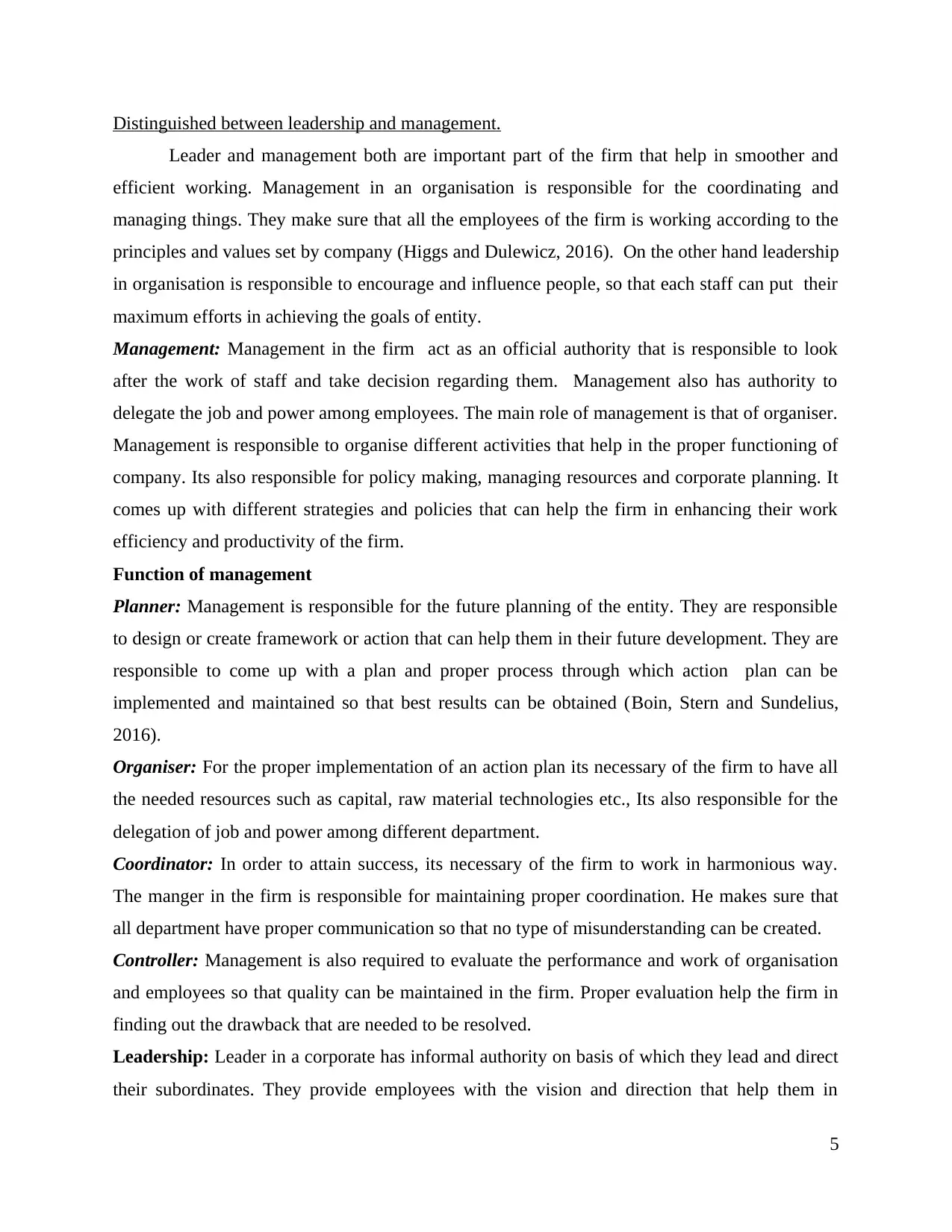
Distinguished between leadership and management.
Leader and management both are important part of the firm that help in smoother and
efficient working. Management in an organisation is responsible for the coordinating and
managing things. They make sure that all the employees of the firm is working according to the
principles and values set by company (Higgs and Dulewicz, 2016). On the other hand leadership
in organisation is responsible to encourage and influence people, so that each staff can put their
maximum efforts in achieving the goals of entity.
Management: Management in the firm act as an official authority that is responsible to look
after the work of staff and take decision regarding them. Management also has authority to
delegate the job and power among employees. The main role of management is that of organiser.
Management is responsible to organise different activities that help in the proper functioning of
company. Its also responsible for policy making, managing resources and corporate planning. It
comes up with different strategies and policies that can help the firm in enhancing their work
efficiency and productivity of the firm.
Function of management
Planner: Management is responsible for the future planning of the entity. They are responsible
to design or create framework or action that can help them in their future development. They are
responsible to come up with a plan and proper process through which action plan can be
implemented and maintained so that best results can be obtained (Boin, Stern and Sundelius,
2016).
Organiser: For the proper implementation of an action plan its necessary of the firm to have all
the needed resources such as capital, raw material technologies etc., Its also responsible for the
delegation of job and power among different department.
Coordinator: In order to attain success, its necessary of the firm to work in harmonious way.
The manger in the firm is responsible for maintaining proper coordination. He makes sure that
all department have proper communication so that no type of misunderstanding can be created.
Controller: Management is also required to evaluate the performance and work of organisation
and employees so that quality can be maintained in the firm. Proper evaluation help the firm in
finding out the drawback that are needed to be resolved.
Leadership: Leader in a corporate has informal authority on basis of which they lead and direct
their subordinates. They provide employees with the vision and direction that help them in
5
Leader and management both are important part of the firm that help in smoother and
efficient working. Management in an organisation is responsible for the coordinating and
managing things. They make sure that all the employees of the firm is working according to the
principles and values set by company (Higgs and Dulewicz, 2016). On the other hand leadership
in organisation is responsible to encourage and influence people, so that each staff can put their
maximum efforts in achieving the goals of entity.
Management: Management in the firm act as an official authority that is responsible to look
after the work of staff and take decision regarding them. Management also has authority to
delegate the job and power among employees. The main role of management is that of organiser.
Management is responsible to organise different activities that help in the proper functioning of
company. Its also responsible for policy making, managing resources and corporate planning. It
comes up with different strategies and policies that can help the firm in enhancing their work
efficiency and productivity of the firm.
Function of management
Planner: Management is responsible for the future planning of the entity. They are responsible
to design or create framework or action that can help them in their future development. They are
responsible to come up with a plan and proper process through which action plan can be
implemented and maintained so that best results can be obtained (Boin, Stern and Sundelius,
2016).
Organiser: For the proper implementation of an action plan its necessary of the firm to have all
the needed resources such as capital, raw material technologies etc., Its also responsible for the
delegation of job and power among different department.
Coordinator: In order to attain success, its necessary of the firm to work in harmonious way.
The manger in the firm is responsible for maintaining proper coordination. He makes sure that
all department have proper communication so that no type of misunderstanding can be created.
Controller: Management is also required to evaluate the performance and work of organisation
and employees so that quality can be maintained in the firm. Proper evaluation help the firm in
finding out the drawback that are needed to be resolved.
Leadership: Leader in a corporate has informal authority on basis of which they lead and direct
their subordinates. They provide employees with the vision and direction that help them in
5
Paraphrase This Document
Need a fresh take? Get an instant paraphrase of this document with our AI Paraphraser
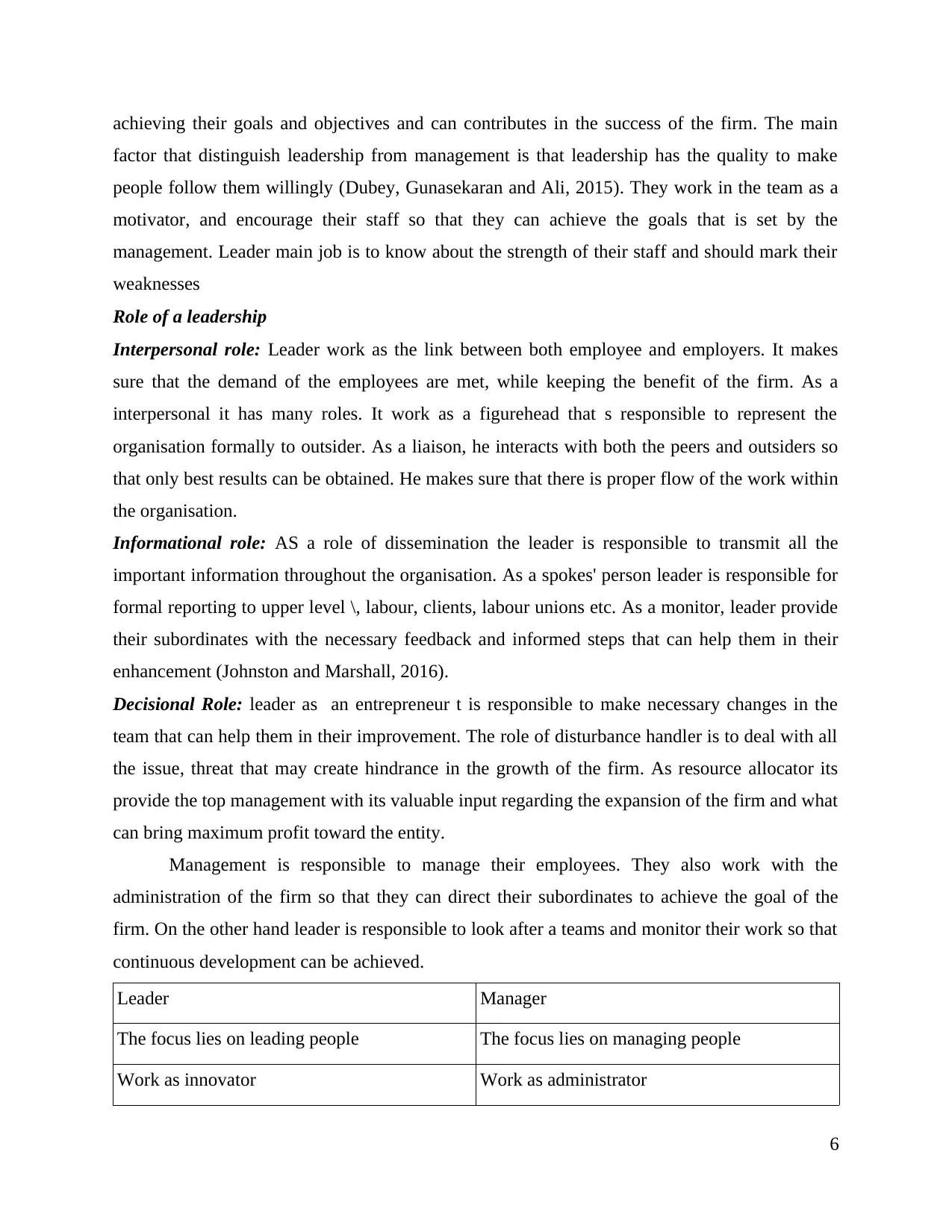
achieving their goals and objectives and can contributes in the success of the firm. The main
factor that distinguish leadership from management is that leadership has the quality to make
people follow them willingly (Dubey, Gunasekaran and Ali, 2015). They work in the team as a
motivator, and encourage their staff so that they can achieve the goals that is set by the
management. Leader main job is to know about the strength of their staff and should mark their
weaknesses
Role of a leadership
Interpersonal role: Leader work as the link between both employee and employers. It makes
sure that the demand of the employees are met, while keeping the benefit of the firm. As a
interpersonal it has many roles. It work as a figurehead that s responsible to represent the
organisation formally to outsider. As a liaison, he interacts with both the peers and outsiders so
that only best results can be obtained. He makes sure that there is proper flow of the work within
the organisation.
Informational role: AS a role of dissemination the leader is responsible to transmit all the
important information throughout the organisation. As a spokes' person leader is responsible for
formal reporting to upper level \, labour, clients, labour unions etc. As a monitor, leader provide
their subordinates with the necessary feedback and informed steps that can help them in their
enhancement (Johnston and Marshall, 2016).
Decisional Role: leader as an entrepreneur t is responsible to make necessary changes in the
team that can help them in their improvement. The role of disturbance handler is to deal with all
the issue, threat that may create hindrance in the growth of the firm. As resource allocator its
provide the top management with its valuable input regarding the expansion of the firm and what
can bring maximum profit toward the entity.
Management is responsible to manage their employees. They also work with the
administration of the firm so that they can direct their subordinates to achieve the goal of the
firm. On the other hand leader is responsible to look after a teams and monitor their work so that
continuous development can be achieved.
Leader Manager
The focus lies on leading people The focus lies on managing people
Work as innovator Work as administrator
6
factor that distinguish leadership from management is that leadership has the quality to make
people follow them willingly (Dubey, Gunasekaran and Ali, 2015). They work in the team as a
motivator, and encourage their staff so that they can achieve the goals that is set by the
management. Leader main job is to know about the strength of their staff and should mark their
weaknesses
Role of a leadership
Interpersonal role: Leader work as the link between both employee and employers. It makes
sure that the demand of the employees are met, while keeping the benefit of the firm. As a
interpersonal it has many roles. It work as a figurehead that s responsible to represent the
organisation formally to outsider. As a liaison, he interacts with both the peers and outsiders so
that only best results can be obtained. He makes sure that there is proper flow of the work within
the organisation.
Informational role: AS a role of dissemination the leader is responsible to transmit all the
important information throughout the organisation. As a spokes' person leader is responsible for
formal reporting to upper level \, labour, clients, labour unions etc. As a monitor, leader provide
their subordinates with the necessary feedback and informed steps that can help them in their
enhancement (Johnston and Marshall, 2016).
Decisional Role: leader as an entrepreneur t is responsible to make necessary changes in the
team that can help them in their improvement. The role of disturbance handler is to deal with all
the issue, threat that may create hindrance in the growth of the firm. As resource allocator its
provide the top management with its valuable input regarding the expansion of the firm and what
can bring maximum profit toward the entity.
Management is responsible to manage their employees. They also work with the
administration of the firm so that they can direct their subordinates to achieve the goal of the
firm. On the other hand leader is responsible to look after a teams and monitor their work so that
continuous development can be achieved.
Leader Manager
The focus lies on leading people The focus lies on managing people
Work as innovator Work as administrator
6
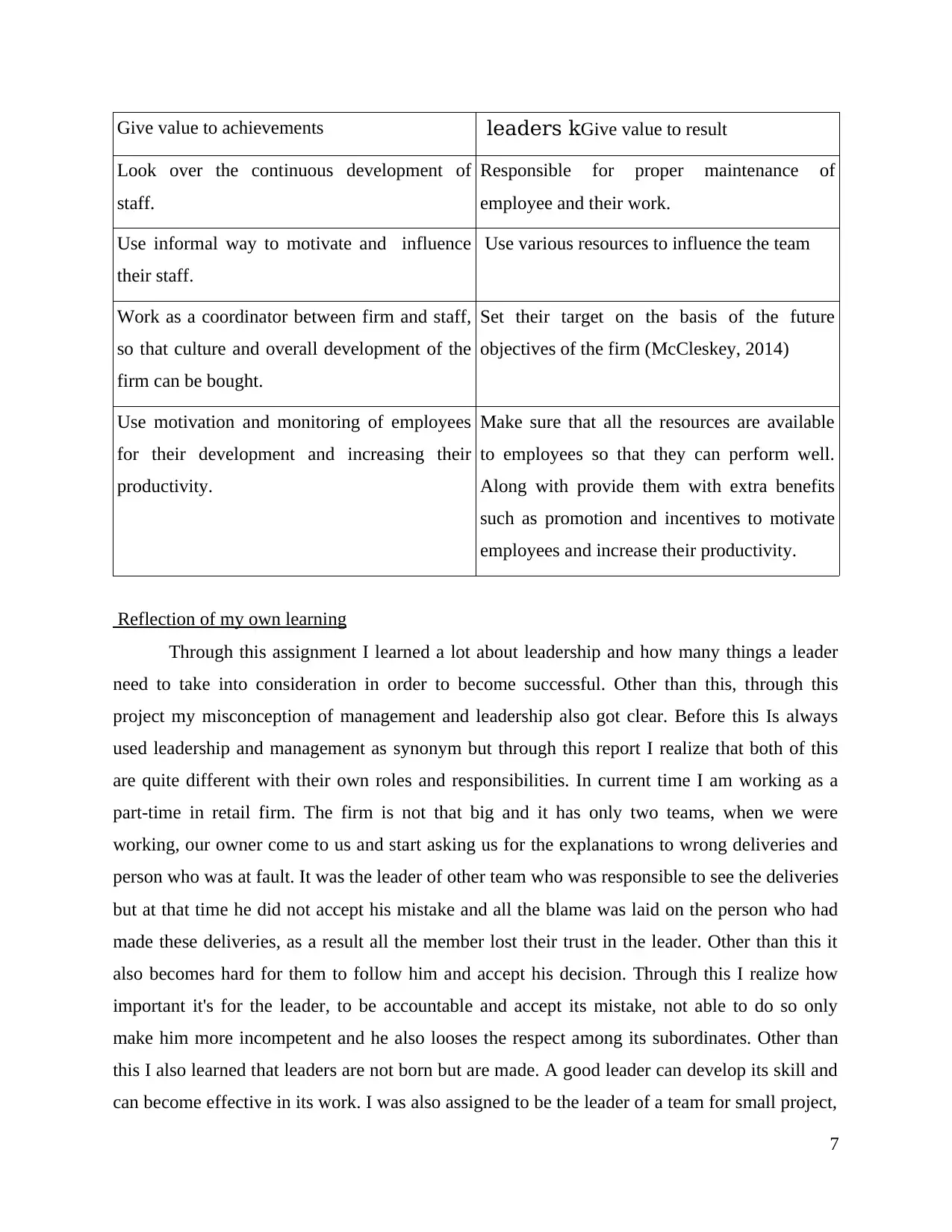
Give value to achievements leaders kGive value to result
Look over the continuous development of
staff.
Responsible for proper maintenance of
employee and their work.
Use informal way to motivate and influence
their staff.
Use various resources to influence the team
Work as a coordinator between firm and staff,
so that culture and overall development of the
firm can be bought.
Set their target on the basis of the future
objectives of the firm (McCleskey, 2014)
Use motivation and monitoring of employees
for their development and increasing their
productivity.
Make sure that all the resources are available
to employees so that they can perform well.
Along with provide them with extra benefits
such as promotion and incentives to motivate
employees and increase their productivity.
Reflection of my own learning
Through this assignment I learned a lot about leadership and how many things a leader
need to take into consideration in order to become successful. Other than this, through this
project my misconception of management and leadership also got clear. Before this Is always
used leadership and management as synonym but through this report I realize that both of this
are quite different with their own roles and responsibilities. In current time I am working as a
part-time in retail firm. The firm is not that big and it has only two teams, when we were
working, our owner come to us and start asking us for the explanations to wrong deliveries and
person who was at fault. It was the leader of other team who was responsible to see the deliveries
but at that time he did not accept his mistake and all the blame was laid on the person who had
made these deliveries, as a result all the member lost their trust in the leader. Other than this it
also becomes hard for them to follow him and accept his decision. Through this I realize how
important it's for the leader, to be accountable and accept its mistake, not able to do so only
make him more incompetent and he also looses the respect among its subordinates. Other than
this I also learned that leaders are not born but are made. A good leader can develop its skill and
can become effective in its work. I was also assigned to be the leader of a team for small project,
7
Look over the continuous development of
staff.
Responsible for proper maintenance of
employee and their work.
Use informal way to motivate and influence
their staff.
Use various resources to influence the team
Work as a coordinator between firm and staff,
so that culture and overall development of the
firm can be bought.
Set their target on the basis of the future
objectives of the firm (McCleskey, 2014)
Use motivation and monitoring of employees
for their development and increasing their
productivity.
Make sure that all the resources are available
to employees so that they can perform well.
Along with provide them with extra benefits
such as promotion and incentives to motivate
employees and increase their productivity.
Reflection of my own learning
Through this assignment I learned a lot about leadership and how many things a leader
need to take into consideration in order to become successful. Other than this, through this
project my misconception of management and leadership also got clear. Before this Is always
used leadership and management as synonym but through this report I realize that both of this
are quite different with their own roles and responsibilities. In current time I am working as a
part-time in retail firm. The firm is not that big and it has only two teams, when we were
working, our owner come to us and start asking us for the explanations to wrong deliveries and
person who was at fault. It was the leader of other team who was responsible to see the deliveries
but at that time he did not accept his mistake and all the blame was laid on the person who had
made these deliveries, as a result all the member lost their trust in the leader. Other than this it
also becomes hard for them to follow him and accept his decision. Through this I realize how
important it's for the leader, to be accountable and accept its mistake, not able to do so only
make him more incompetent and he also looses the respect among its subordinates. Other than
this I also learned that leaders are not born but are made. A good leader can develop its skill and
can become effective in its work. I was also assigned to be the leader of a team for small project,
7
⊘ This is a preview!⊘
Do you want full access?
Subscribe today to unlock all pages.

Trusted by 1+ million students worldwide
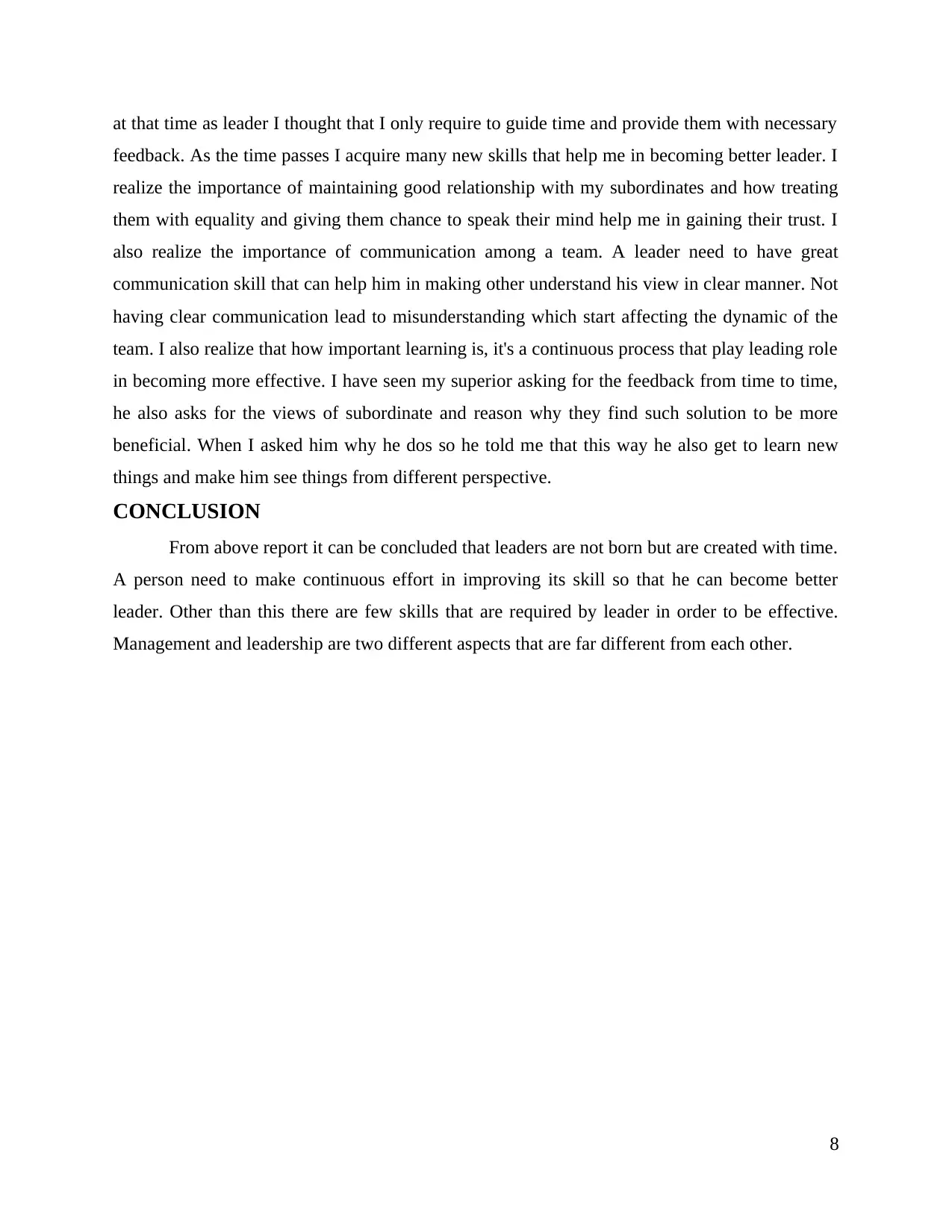
at that time as leader I thought that I only require to guide time and provide them with necessary
feedback. As the time passes I acquire many new skills that help me in becoming better leader. I
realize the importance of maintaining good relationship with my subordinates and how treating
them with equality and giving them chance to speak their mind help me in gaining their trust. I
also realize the importance of communication among a team. A leader need to have great
communication skill that can help him in making other understand his view in clear manner. Not
having clear communication lead to misunderstanding which start affecting the dynamic of the
team. I also realize that how important learning is, it's a continuous process that play leading role
in becoming more effective. I have seen my superior asking for the feedback from time to time,
he also asks for the views of subordinate and reason why they find such solution to be more
beneficial. When I asked him why he dos so he told me that this way he also get to learn new
things and make him see things from different perspective.
CONCLUSION
From above report it can be concluded that leaders are not born but are created with time.
A person need to make continuous effort in improving its skill so that he can become better
leader. Other than this there are few skills that are required by leader in order to be effective.
Management and leadership are two different aspects that are far different from each other.
8
feedback. As the time passes I acquire many new skills that help me in becoming better leader. I
realize the importance of maintaining good relationship with my subordinates and how treating
them with equality and giving them chance to speak their mind help me in gaining their trust. I
also realize the importance of communication among a team. A leader need to have great
communication skill that can help him in making other understand his view in clear manner. Not
having clear communication lead to misunderstanding which start affecting the dynamic of the
team. I also realize that how important learning is, it's a continuous process that play leading role
in becoming more effective. I have seen my superior asking for the feedback from time to time,
he also asks for the views of subordinate and reason why they find such solution to be more
beneficial. When I asked him why he dos so he told me that this way he also get to learn new
things and make him see things from different perspective.
CONCLUSION
From above report it can be concluded that leaders are not born but are created with time.
A person need to make continuous effort in improving its skill so that he can become better
leader. Other than this there are few skills that are required by leader in order to be effective.
Management and leadership are two different aspects that are far different from each other.
8
Paraphrase This Document
Need a fresh take? Get an instant paraphrase of this document with our AI Paraphraser
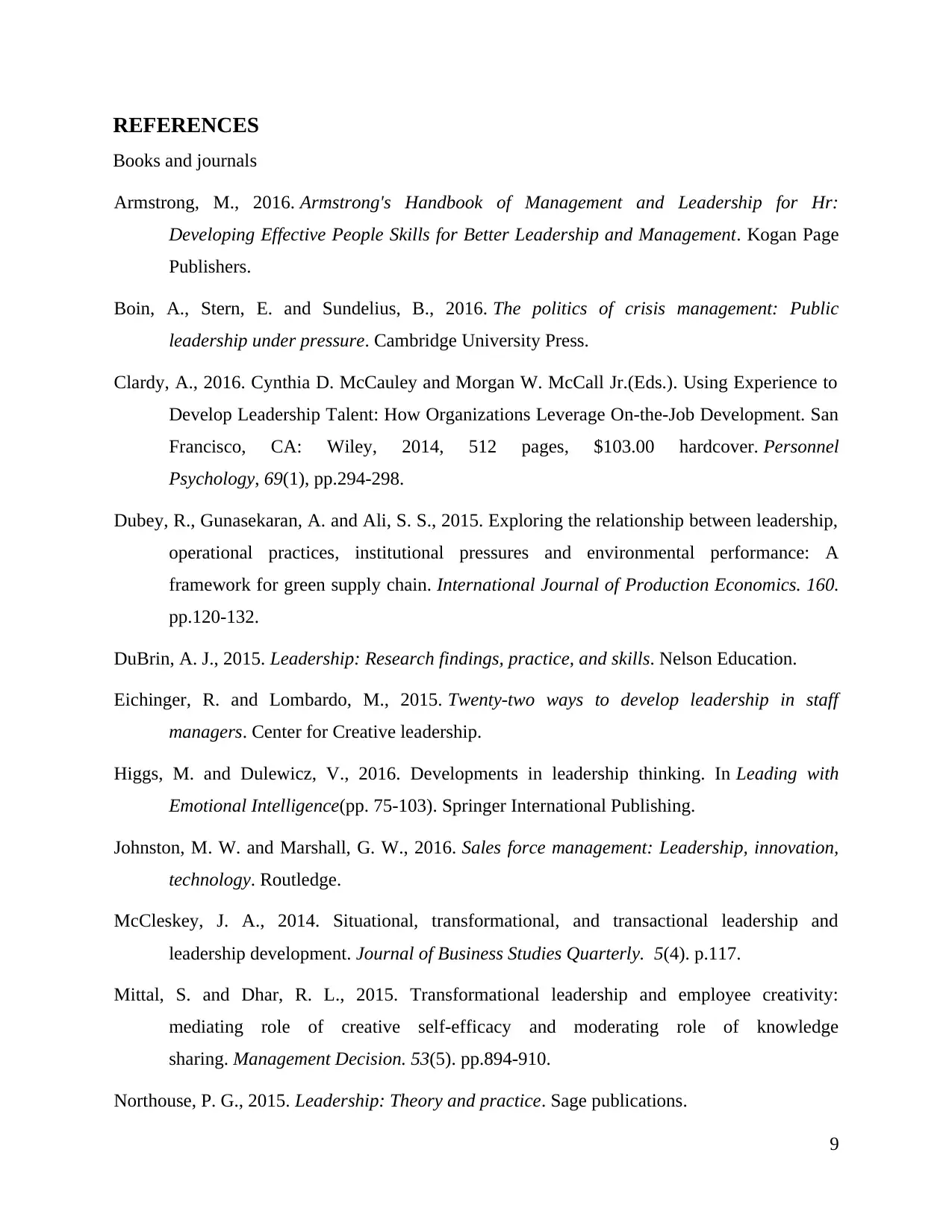
REFERENCES
Books and journals
Armstrong, M., 2016. Armstrong's Handbook of Management and Leadership for Hr:
Developing Effective People Skills for Better Leadership and Management. Kogan Page
Publishers.
Boin, A., Stern, E. and Sundelius, B., 2016. The politics of crisis management: Public
leadership under pressure. Cambridge University Press.
Clardy, A., 2016. Cynthia D. McCauley and Morgan W. McCall Jr.(Eds.). Using Experience to
Develop Leadership Talent: How Organizations Leverage On‐the‐Job Development. San
Francisco, CA: Wiley, 2014, 512 pages, $103.00 hardcover. Personnel
Psychology, 69(1), pp.294-298.
Dubey, R., Gunasekaran, A. and Ali, S. S., 2015. Exploring the relationship between leadership,
operational practices, institutional pressures and environmental performance: A
framework for green supply chain. International Journal of Production Economics. 160.
pp.120-132.
DuBrin, A. J., 2015. Leadership: Research findings, practice, and skills. Nelson Education.
Eichinger, R. and Lombardo, M., 2015. Twenty-two ways to develop leadership in staff
managers. Center for Creative leadership.
Higgs, M. and Dulewicz, V., 2016. Developments in leadership thinking. In Leading with
Emotional Intelligence(pp. 75-103). Springer International Publishing.
Johnston, M. W. and Marshall, G. W., 2016. Sales force management: Leadership, innovation,
technology. Routledge.
McCleskey, J. A., 2014. Situational, transformational, and transactional leadership and
leadership development. Journal of Business Studies Quarterly. 5(4). p.117.
Mittal, S. and Dhar, R. L., 2015. Transformational leadership and employee creativity:
mediating role of creative self-efficacy and moderating role of knowledge
sharing. Management Decision. 53(5). pp.894-910.
Northouse, P. G., 2015. Leadership: Theory and practice. Sage publications.
9
Books and journals
Armstrong, M., 2016. Armstrong's Handbook of Management and Leadership for Hr:
Developing Effective People Skills for Better Leadership and Management. Kogan Page
Publishers.
Boin, A., Stern, E. and Sundelius, B., 2016. The politics of crisis management: Public
leadership under pressure. Cambridge University Press.
Clardy, A., 2016. Cynthia D. McCauley and Morgan W. McCall Jr.(Eds.). Using Experience to
Develop Leadership Talent: How Organizations Leverage On‐the‐Job Development. San
Francisco, CA: Wiley, 2014, 512 pages, $103.00 hardcover. Personnel
Psychology, 69(1), pp.294-298.
Dubey, R., Gunasekaran, A. and Ali, S. S., 2015. Exploring the relationship between leadership,
operational practices, institutional pressures and environmental performance: A
framework for green supply chain. International Journal of Production Economics. 160.
pp.120-132.
DuBrin, A. J., 2015. Leadership: Research findings, practice, and skills. Nelson Education.
Eichinger, R. and Lombardo, M., 2015. Twenty-two ways to develop leadership in staff
managers. Center for Creative leadership.
Higgs, M. and Dulewicz, V., 2016. Developments in leadership thinking. In Leading with
Emotional Intelligence(pp. 75-103). Springer International Publishing.
Johnston, M. W. and Marshall, G. W., 2016. Sales force management: Leadership, innovation,
technology. Routledge.
McCleskey, J. A., 2014. Situational, transformational, and transactional leadership and
leadership development. Journal of Business Studies Quarterly. 5(4). p.117.
Mittal, S. and Dhar, R. L., 2015. Transformational leadership and employee creativity:
mediating role of creative self-efficacy and moderating role of knowledge
sharing. Management Decision. 53(5). pp.894-910.
Northouse, P. G., 2015. Leadership: Theory and practice. Sage publications.
9
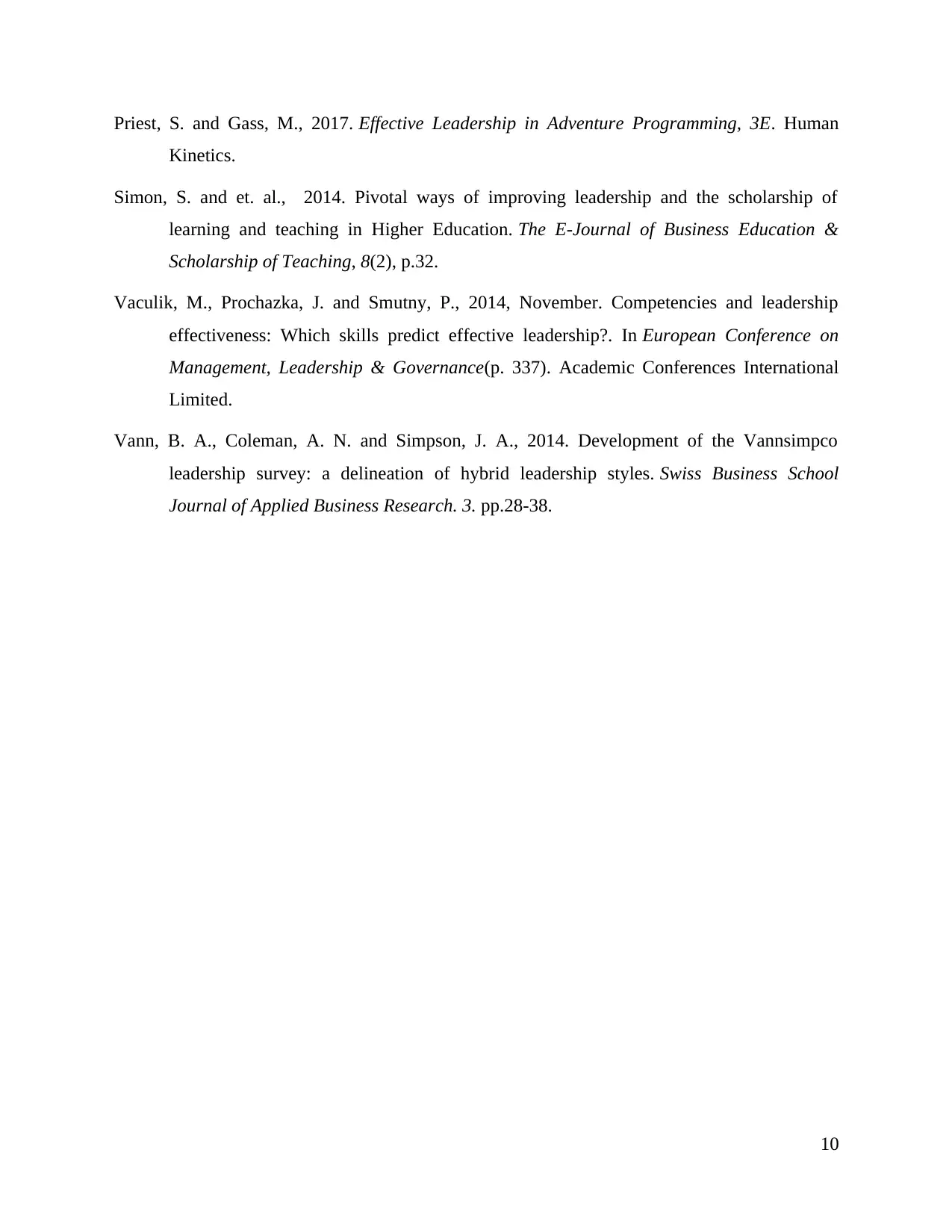
Priest, S. and Gass, M., 2017. Effective Leadership in Adventure Programming, 3E. Human
Kinetics.
Simon, S. and et. al., 2014. Pivotal ways of improving leadership and the scholarship of
learning and teaching in Higher Education. The E-Journal of Business Education &
Scholarship of Teaching, 8(2), p.32.
Vaculik, M., Prochazka, J. and Smutny, P., 2014, November. Competencies and leadership
effectiveness: Which skills predict effective leadership?. In European Conference on
Management, Leadership & Governance(p. 337). Academic Conferences International
Limited.
Vann, B. A., Coleman, A. N. and Simpson, J. A., 2014. Development of the Vannsimpco
leadership survey: a delineation of hybrid leadership styles. Swiss Business School
Journal of Applied Business Research. 3. pp.28-38.
10
Kinetics.
Simon, S. and et. al., 2014. Pivotal ways of improving leadership and the scholarship of
learning and teaching in Higher Education. The E-Journal of Business Education &
Scholarship of Teaching, 8(2), p.32.
Vaculik, M., Prochazka, J. and Smutny, P., 2014, November. Competencies and leadership
effectiveness: Which skills predict effective leadership?. In European Conference on
Management, Leadership & Governance(p. 337). Academic Conferences International
Limited.
Vann, B. A., Coleman, A. N. and Simpson, J. A., 2014. Development of the Vannsimpco
leadership survey: a delineation of hybrid leadership styles. Swiss Business School
Journal of Applied Business Research. 3. pp.28-38.
10
⊘ This is a preview!⊘
Do you want full access?
Subscribe today to unlock all pages.

Trusted by 1+ million students worldwide
1 out of 12
Related Documents
Your All-in-One AI-Powered Toolkit for Academic Success.
+13062052269
info@desklib.com
Available 24*7 on WhatsApp / Email
![[object Object]](/_next/static/media/star-bottom.7253800d.svg)
Unlock your academic potential
Copyright © 2020–2026 A2Z Services. All Rights Reserved. Developed and managed by ZUCOL.




